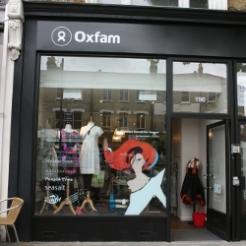Ian Allsop bemoans the fact that his charity-shops expertise hasn’t led to a stellar business career.
As I write, the charity sector is furiously lobbying away to make sure the lobbying bill doesn’t stop them lobbying. You see, the government doesn’t like people speaking out about stuff if it makes them look bad, especially lefties with their do-gooder ways and lofty ideals about social justice.
Not that they would admit it of course, and any unintended consequence of the legislation that would accidently prevent charities from campaigning is just that.
The irony is that if the umbrella-body ‘top bods’ and lawyers are successful in redrafting the bill to clarify things, the government will become even more determined to shut them up. Not that they want to of course.
And one issue on which charities will need to continue to campaign is the oft-misunderstood rates relief issue. I was reading a book by Hunter Davies recently called Behind the Scenes at the Museum of Baked Beans, where he visited obscure museums and explored the motivation behind collecting things.
Rolling out the hoary chestnut
He was lamenting the fact that he didn’t like charity shops as much as he used to: “I spotted an Oxfam bookshop, one of those dedicated ones that have become more popular in recent years, though their prices are not all that remarkable, considering they get their books for free and don’t pay their staff or council tax. Real bookshops hate them of course, as they compete unfairly for the same market.”
I actually swore audibly when I read this, both because of its partial, generalised inaccuracy, and for expressing such an old chestnut so hoarily.
Apart from anything else, it seems perfectly acceptable that charity shops should enjoy rates relief because they are making money that goes to, well, charity. And it’s not them putting small business out of business by moving in and taking over their shops.
Whenever I see such things I always feel like a bit of an expert on charity shops, and it takes me back five years to when I really was, courtesy of my role editing the Charity Shops Survey, published by civilsociety.co.uk. The annual tome has long been the definitive snapshot of the charity retail market – subscribers can read highlights and download the full survey here – and the 2008 version reported record profits.
It was early doors in the credit crunch and suddenly the media were all over it like an ill-fitting second-hand suit. I did a couple of radio slots before the big one came. The BBC wanted me to go on ‘News 24’ to discuss the results.
As the car they sent to ferry me to Shepherd’s Bush turned up, I reflected on how I would be able to turn the experience into a column in a few years’ time.
Actually it was all a bit of a blur. I got there, I sat in some draughty waiting room, then I was on and then it was over.
Luckily my mum recorded it and I recently watched it to remind myself of what I actually said. This in itself demonstrates the lengths I will go to get material for this piece, as it was on an old VHS tape (TDK 240 minutes – with ‘Ian’ written maternally and neatly on the box) and meant I had to dust down our old video player and connect it to the TV to watch it.
The most disgraceful part of the whole thing was that they spelt my surname wrong on the on-screen caption. The narrative the Beeb wanted was that the healthy profits were due to the worsening economy forcing people to buy second-hand.
Despite my assertion, live to the nation, that the profit figures actually related to the period before the credit crunch, the BBC carried on with its preconceived angle and ran a scrolling banner saying “charity shops booming despite credit crunch” at exactly the same time as I was cautioning about drawing such a conclusion.
Expert on rates relief
The rates relief issue came up and although I got the 80/20 split on mandatory/discretionary rates relief the wrong way round (so perhaps I am not such an expert after all), I sounded knowledgeable.
Five minutes it lasted, then it was on to an item about Manchester City. And I headed back home in a car very kindly paid for by myself, the licence-fee payer.
I was on with a personal finance expert from Moneymagpie who I am astonished to see hasn’t subsequently gone bankrupt, given the level of nonsense she was spouting, but is now an international finance expert, columnist and comedy writer.
Surely that should have been my career following the interview. And perhaps in a parallel universe that is what happened to Ian Allsopp.









